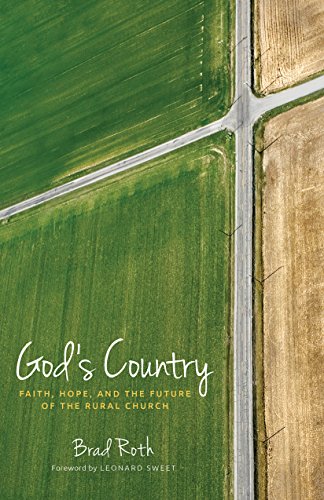A Brief Book Summary from Books At a Glance
By Joshua K. Smith
Author
Brad Roth (Harvard Divinity School) serves as the pastor of West Zion Mennonite Church, a small congregation in Mound-ridge, Kansas. He has served small congregations in Washington State, Peru, and Kansas. He also writes about encountering God at DoxologyProject.com.
Overview
God’s Country is an examination into often neglected beauty and mystery of rural ministry. Roth’s book helps pastors in both the city and country understand how their ministries are intertwined for the glory of God. The honesty in Roth’s prose about the health of the local comes with great timing in the wake of church-growth culture that leans heavily on pragmatics and business models. This book teaches both rural and city pastors what it means to abide in a community with the presence and love of Jesus.
Outline
- Gather Up the Fragments: Reclaiming a Kingdom Vision for the Rural Church
- Praise in Place: God is Somewhere
- Abide: Becoming the Dust of the Earth
- Watch: Vida Painted on an Adobe Wall
- Pray: Learning to Pray with Chickens
- Grow: Weirding the Axes
- Work the Edges: Stepping Across the Barbed Wire
- Learn to Die: Congregational Are Moriendi
- Befriend: On Not Being Useful
- Dream: Zion on the Migrash
Book Summary
Chapter One: Gather Up the Fragments: Reclaiming a Kingdom Vision for the Rural Church
What role does the rural church play in Christs’ kingdom? Without rural churches, there would be no church within our cities. The existence of the rural church is a testament to the commitment of Christ to all places and peoples. Yet because of both the positive and negative sentiments associated with the word “rural,” more often than not the view of the rural church is either “idealized or disparaged” neither fully recognizing a kingdom vision for rural churches.
What does a kingdom vision for the rural church look like? It is a vision that sees the rural church as having the same identity in Christ as the global church. This is not mere refining of ecclesiology (doctrines and definitions) but primarily about ecclesioculture: learning to think respectfully and completely about rural churches (all churches). This means that instead of idealizing or bemoaning the aspects of the rural church, one learns to “take time to cherish the church’s story and dream with the church about its future.” However, denominational efforts (cf. NCRLC) have diminished since the 1930s. The most notable reason for this lack of investment is a growing disparity between urban and rural perspectives and populations.
The significant difference between urban and rural peoples is perception, how they view the space they occupy. Do the people value being known or by knowing. The rural perspective values being known, a familiarity of people and values. Both the urban and rural churches are required to build the kingdom of God, understanding their uniqueness and complexity.
Chapter Two: Praise in Place: God is Somewhere
What makes a place somewhere? For most of us, the narrative that is taught about areas that are “somewhere” to be is usually within an urban context. The countryside is for a vacation or short visit but not a place to live and thrive. Yet we see in Scripture that open or empty places are, in fact, “somewhere” to be, for the Lord is occupying these spaces (cf. Gen 28). Even within the pastoral ministry, the narrative that is pushed is for one to minister to serve in urban and thriving environments, the county is a dead end. This view leads to what the Greeks labeled as acedia: spiritual despair or literally “without care.” Acedia is dangerous because it blinds us to the worth of rural spaces (churches) and hinders one’s capacity to love and serve in those environments. According to Christopher J. F. Rutledge (Anglican), “one out of eight rural pastors feels that he has accomplished little or worth in his ministry.”
[To continue reading this summary, please see below....]The remainder of this article is premium content. Become a member to continue reading.
Already have an account? Sign In
